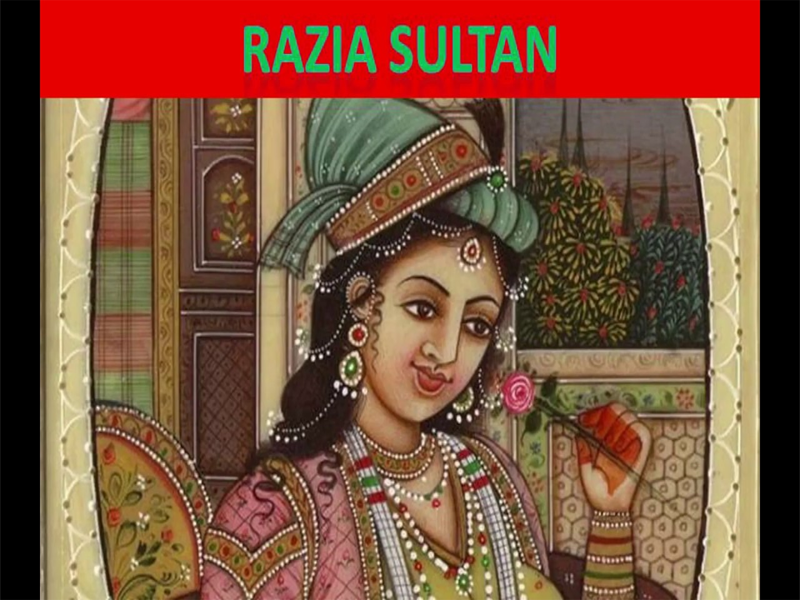Razia sultana (1205-1240) First female muslim ruler of South Asia

- 540
- 0
Razia sultana was the first Muslim female ruler. She ruled in Delhi from 1236 to 1240 as the Sultan herself - it was a title never before bestowed on a woman, a position of power never before attained by a woman. She was the fifth Mamluk Sultan, one of the few female sovereigns ever in the entire history of Islamic civilizations across the world.
Razia it is believed had refused to be addressed as a Sultana (as per her gender) as that word meant "wife or mistress of a Sultan", but claimed the title "Sultan", as she herself was the premier.
RAZIA - THE RULER:
Razia's ascent to the throne gains immense historical significance not just because she was a woman ruler, but also because she did not come from nobility per se. Her ancestors were Turkish Seljuk slaves and their dynasty was called the Slave Dynasty, thus making her rulership a subversion of existing power structures at many levels.
Her father Iltutmish had arrived in Delhi as a slave serving under Qutb-ud-din and through his bravery and skill attained the position of a provincial governor. When Qutb-ud-din died, Iltutmish garnered support from the then Turkish nobility and ascended to be the sultan, the first of the Slave dynasty.
In his last days Iltutmish almost rewrote history by appointing his daughter Razia as his heir apparent. No ruler before him had ever chosen a woman successor. However, Iltutmish, realising that she was more skilled and fit to rule the kingdom than her brothers, chose her, considering her gender no barrier to her abilities.
Razia was raised as a bold, young girl. She had trained in military skills and professional warfare along with her brothers and other children of the aristocratic class and had good knowledge of state administration too.
However, those skills were imparted to her only expecting her to later make a good queen to a king and offer advice and assistance if needed - not to be a ruler herself. Therefore, her ascent was strongly opposed by even from close family. After her father passed away, her brother took over the throne, but was assassinated in 6 short months, after which Razia claimed the throne that was rightfully hers.
After becoming the Sultan of Delhi she adopted a gender-neutral attire and proved to be an efficient, capable, and brave ruler. She was widely respected and loved by her officials and public but one of her brothers usurped the throne. In the conflicts that followed, Razia was brutally killed.
INFANTILE AND EARLY LIFE:
Razia sultana was born Raziya al-Din in 1205 in Budaun, India. She was Shams-ud-din Iltutmish's only daughter and had three brothers. Her mother was Qutb-ud-din's daughter who was married to her father because of his skill and valour.
Upon Qutb-ud-din's death his son Aram Baksh inherited the throne in 1210. He did not prove to be a very competent ruler and hence Iltutmish took over the throne with the help of the then Turkish nobility.
Iltutmish proved to be a more efficient ruler and also very liberal-minded. He imparted a similar training in martial arts and administration to all his children, including Razia.
In her formative years, Razia had very little interaction with the women in the harem, so she never really imbibed the customary demure behaviour of women of the contemporary Muslim society of her times. Even during her father's reign as a Sultan, Razia assisted her father actively in the affairs of State. As Sultan, contrary to custom, she displayed her face in public and openly rode an elephant into battles as the chief of her army.
Over this period, Iltutmish realised that while all his sons were only interested in enjoying the royal privileges and pleasures, Razia was most skilled and sincere among them. He broke away from from the Muslim canon of every dynasty before him and named Razia as his heir apparent, the first woman successor of a Sultan ever.
Razia's Sovereignty:
Shams-ud-din Iltutmish passed away on 30 April 1236. Even though he had already appointed Razia was his heir apparent, the existing Muslim nobility was completely against accepting a woman as their sultan. Thus the political pressure groups ensured that instead of Razia her brother Rukn ud din Firuz was made the Sultan.
The new Sultan was a complete failure as a ruler. It is believed that Iltutmish's widow Shah Turkaan ran the government during his brief reign for all practical purposes, while the Sultan remained immersed in enjoying his royal status. After just six months in November a court conspiracy resulted in the assassination of both Ruknuddin and his mother Shah Turkaan.
Razia came to power on 10 November 1236 and ascended the throne with the formal name of Jalâlat-ud-Dîn Raziyâ. As a ruler she gave up traditional Muslim woman's attire, including the pardah and adopted gender-neutral attire, similar to what male rulers before her used to wear. Her giving up of the veil in shocked the conservative Muslims and was not taken to very kindly by the religious class.
She exercised authority with ease and confidence and ordered coins to be minted in her name as "Pillar of Women, Queen of the Times, Sultana Razia, daughter of Shamsuddin Altumish".
Her training and her father's tutelage came in handy for her as a good ruler. She was an unabashed a woman and brave warrior. Razia sultana led her forces from the front in battles and conquered various new territories and in order to strengthen her kingdom. As an administrator too Razia was no less than what Delhi had seen in Sultan's before her.
She was also a secular Sultan and established several educational institutions and public libraries. Along with the learning of Qur'an she laid emphasis for all kinds of new learning. Traditional works in the sciences and literature from all cultures other than Islam were also studied in the institutions.
However, her becoming the ruler was not accepted by the Turkish nobles who considered a woman becoming the Sultan as an insult to all the male warriors and nobles. In the leadership of one such nobleman Malik Ikhtiar-ud-din Aitigin, a conspiracy against Razia was hatched.
Malik Ikhtiar-ud-din Altunia, the governor of Bhatinda who was surprisingly Razia's childhood friend, was the first to raise a revolt against her rule. She did bravely lead her army against him, but following a bitter defeat was taken prisoner. Her brother, Muizuddin Bahram Shah subsequently usurped the throne.
Razia's Life and Inheritance:
Razia was the first and also the last female ruler of the Delhi Sultanate. She bravely defied conservative traditions and proved for the first time to the country that gender was not a barrier in ability.
During her reign as the Sultan, she was rumoured to be close to one of her Abyssinian slaves - Jamaluddin Yaqut. This was used by her opponents to assassinate her character by spreading rumours that she was in an amorous relationship with him.
Yaqut was killed in the battle between Razia and Altunia, while Razia was captured and imprisoned at Lila Mubarak in Bathinda. But eventually, Malik Ikhtiar-ud-din Altunia who was Razia's childhood friend softened, and they eventually got married.
Razia with her husband's support decided to take back her kingdom from her brother but were defeated and fled Delhi. In October 1240 they are believed to have been robbed and killed by several co-conspirators of her brothers.

















































